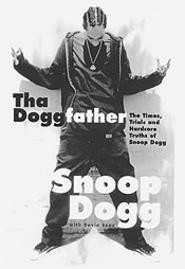He tells his story (written in the first person) in harrowing detail, careful to stick to the kind of language (blunt as it may be) that even non-inhabitants of the ghetto will understand. And make no mistake, he's a man on a mission -- namely "to increase the peace, to spread the music, to elevate and educate." It's a pledge he repeats often here. "I paid the price," he writes of his days as a gangbanger, crack cocaine dealer, ex-con, and Long Beach Crip, "so that maybe you don't have to."
Broadus's story begins on October 20, 1971, in Long Beach, California, where he was born, the second of three sons, to Beverly Broadus. Broadus, whose father left when he was just a toddler, has nothing but praise for the mother who raised him, whom he credits with passing along her faith in God, instilling within him a strong self-confidence, and exposing him to the '70s soul music -- which she often sang along to on the radio -- Broadus still loves to this day. "The bottom line," he remembers, "was that none of us kids ever felt underprivileged, disadvantaged, or inferior to anyone we might pass on the street, white or black. Mama loved us. God loved us. Nothing else mattered."
Those simpler, more idyllic days came to a close when Broadus moved out of his mother's house after she refused his demand to ditch her abusive boyfriend. He found himself out on his own during a time when "the pimp and the outlaw, the thug and the gangsters" were the new heroes. Broadus, who often interrupts his narrative to sound off on one issue or another, doesn't hesitate to castigate some ghetto residents for what he sees as a lack of personal responsibility. ("What about the niggers themselves? None of them ever want to cop to the hard truth that it wasn't some politician that burned down the ghetto, got all the bitches pregnant, and all the youngsters hooked on crack. That was us, doing it to ourselves.")
And speaking of the "hardcore truths" of the book's subtitle, Broadus also takes exception to what he sees as white folks' "attitude of entitlement," likening them to "aliens from another planet." Returning to his narrative, Broadus recalls his tenure in the Six One gang, a local Crip chapter where he began his career as a crack dealer ("I can't say I exactly feel good about having a whole mob of crackheads looking for me every time they wanted to get high," he remembers, "but on the other hand, I understood that's how you do business: by building your clientele"). Though Broadus condemns his old life, he occasionally sounds overly fond of his days as a crack-dealing Crip.
Broadus's own life took a new direction when, at the suggestion of longtime friend Warren G, he decided to rap at a party held to introduce his girlfriend (and now wife Shantay) to his homies and fellow gang members. The positive feedback his performance received gave him a new focus for his energies. "Rap was suddenly the meaning of my life and the middle of my world," he remembers.
Caught dealing crack just when he had himself a good game plan, Broadus spent the next six months in prison reassessing his life. Upon release, he left the gang life behind, took a minimum-wage job at a small grocery store, and began putting together demo tapes after hours. Things began looking up for Broadus when Warren G badgered hotshot rap producer and recording star Dr. Dre (who just happened to be G's half-brother) to give Broadus a hearing. Impressed with Broadus's unhurried rap style, Dre gave Broadus his first big break, asking him to write a song for the movie Deep Cover, which in turn led to Dre's collaboration with Broadus on 1992's multi-million seller The Chronic.
Though the rest is, as they say, history, Broadus's past had a way of catching up with him, most notoriously in his 1993 arrest in connection with the drive-by shooting death of gangbanger Phillip Woldermariam (who was clearly aiming for Broadus) by the rapper's bodyguard. The episode left him facing a possible life sentence -- the daily stress of his three-year wait (which resulted in a not-guilty verdict in 1996), he writes, "just about killed me."
Today, Broadus leads a more relaxed life, helped along no doubt by his prodigious marijuana habit, in which he indulges from sunup to sundown (even as he agonizes over the example he's setting for his two sons) and a move to L.A.'s peaceful West Valley. Citing the hassles of fame and the conviction that his high profile makes him a "sitting duck for the ongoing turf war between the Crips and the Bloods," Broadus sounds plenty defensive about his move to the 'burbs. Not so in his choice to leave Death Row Records. For all his praise of Dre as a "genius" producer, he readily expresses his discomfort with the gangster-style tactics employed by Dre and partner Suge Knight.
Similarly, he recalls his friendship with volatile East Coast rapper Tupac Shakur with fondness, even as he laments the latter's inability to rise above the ghetto mentality. Just don't expect Broadus to divulge any further info on what he may or may not know about the East Coast-West Coast gangsta war or Tupac's death -- he won't go there. (He's about keeping the peace, remember, not inflaming any existing tensions.)
Instead, Broadus offers a plea to his "brothers and sisters" to "stop killing each other," imploring them to turn their "righteous anger on the target where it belongs -- the system that keeps us oppressed and down and addicted to crack and attacking in the dead of night, like wild animals tearing at each other's throats." It's an open question though, as to whether he's merely preaching to the converted.


